Light in the Midst of War
Narrated by Faisal Hu (胡光中)
Compiled by Wang Hui-ping (王慧萍) and Huang Hsiu-hua (黃秀花)
Translated by Wu Hsiao-ting (吳曉婷)
Light in the Midst of War
Narrated by Faisal Hu (胡光中)
Compiled by Wang Hui-ping (王慧萍) and Huang Hsiu-hua (黃秀花)
Translated by Wu Hsiao-ting (吳曉婷)
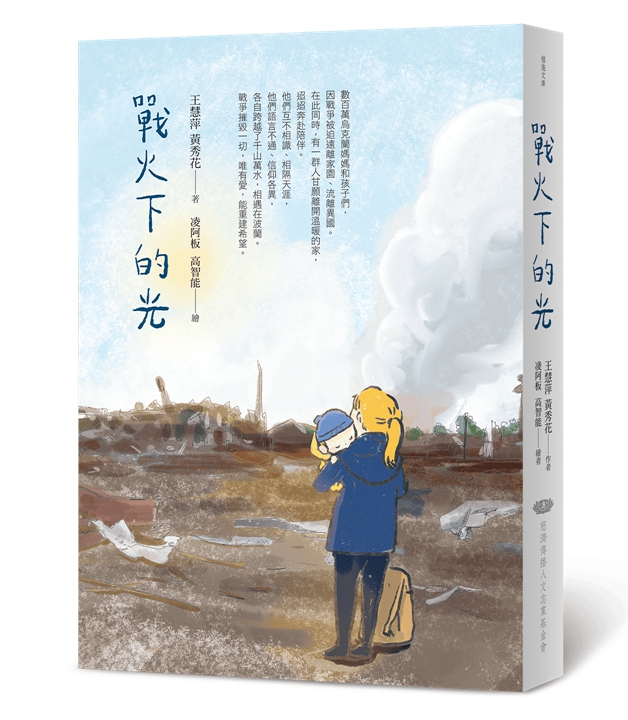
The book cover of Light in the Midst of War
Our plane took off from Istanbul, Türkiye, and arrived in Warsaw, the capital of Poland, around six o'clock in the evening of November 23, 2022. The sky was dark by the time we left the airport, the temperature a frigid 1°C (33.8°F). Even with a coat on, I could feel the biting cold.
My wife, Nadya Chou (周如意), and I, both Tzu Chi volunteers, had been away from Poland for four months, and the season had transitioned into winter. This marked our third visit in seven months. We were accompanied by Basil Khalil and Hani Aldib, two IT engineers and Syrian refugees.
We had come to Poland again out of concern for the welfare of our Ukrainian friends, displaced as they were in a foreign land. The Russia-Ukraine war had just reached a new peak, and the weather was growing colder. The European Union had estimated that it would ignite a fresh wave of refugees. Our objective on this journey was twofold: to distribute aid to vulnerable Ukrainian families stranded here in order to help them endure the winter, and to formulate long-term assistance plans to provide ongoing support.
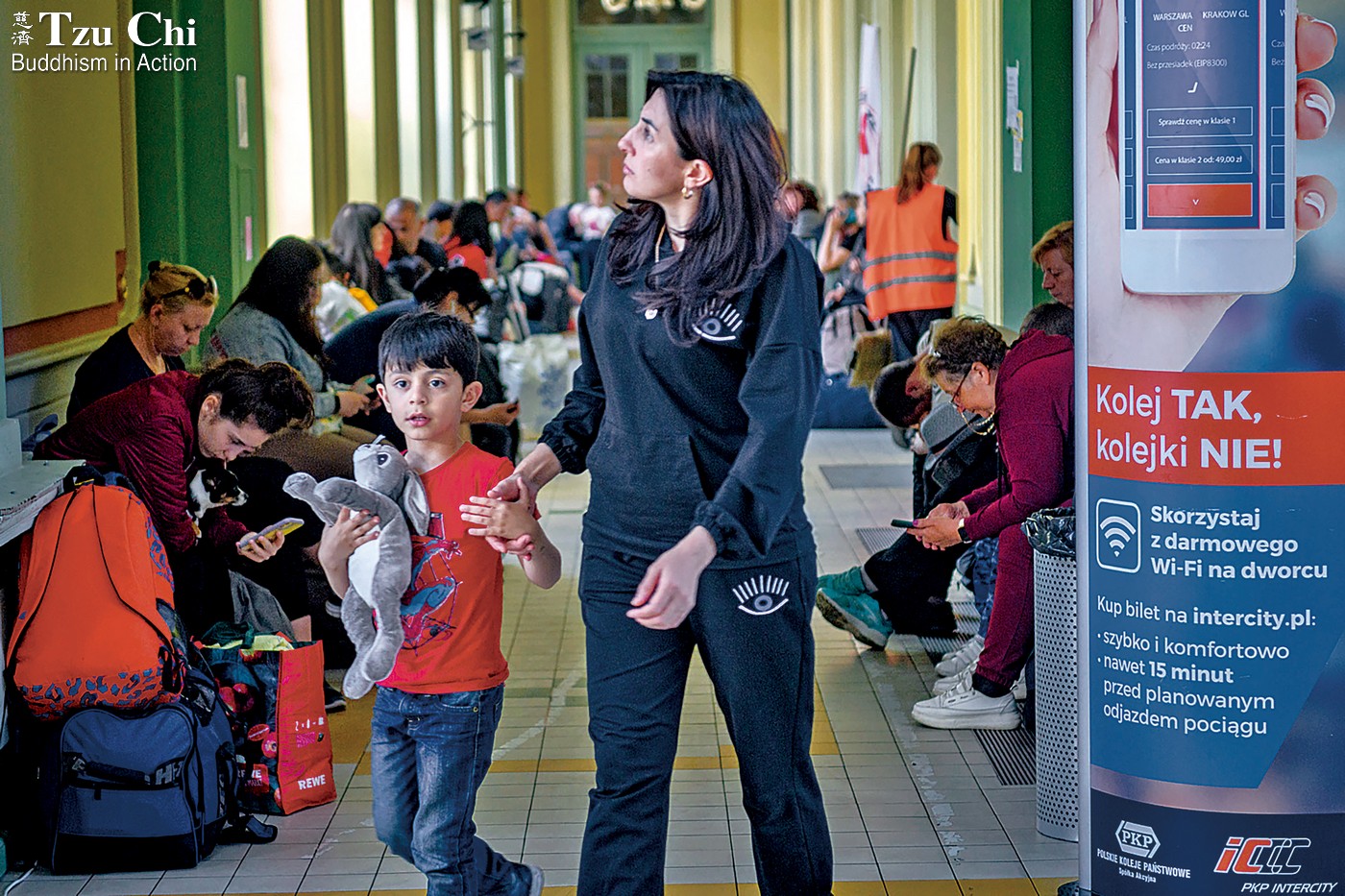
After the Russian invasion in February 2022, the Ukrainian government forbade men aged 10 to 60 from leaving the country. As a result, the majority of those who fled the country were women, children, and older people. (Photo by Alberto Buzzola)
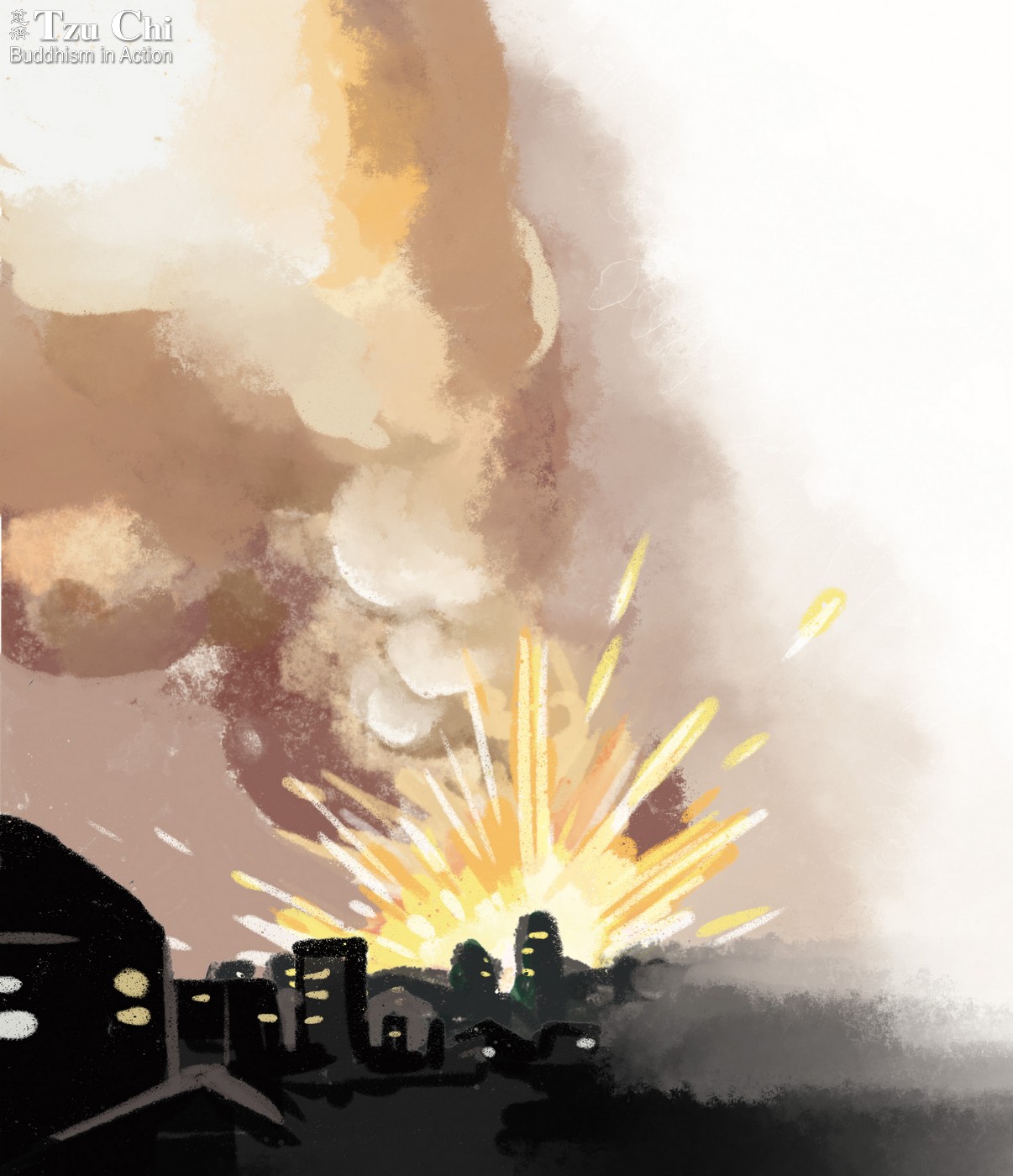
An illustration featured in the book Light in the Midst of War. (Graphic by Ling A-ban)
Beauty lies in the state of mind
The temperature continued to drop throughout the night. I awoke a little after 3 a.m. Peering out of the window, I discovered that it was already snowing.
Later that morning, still before dawn, my wife, myself, and three other representatives from the Tzu Chi Foundation stepped out into the snow under a twinkling starry sky. My wife was wearing a padded jacket embroidered with the Tzu Chi logo. It was the very uniform she wore during our initial participation in Tzu Chi's disaster relief efforts following the powerful earthquake in Türkiye in 1999. It had been 23 years since we embarked on the path of volunteer service, and the jacket had accompanied us through numerous disaster relief missions in many countries.
At the early hour of 4:20 a.m., Warsaw Central Station appeared both familiar and unfamiliar. Just over half a year earlier, the place was filled with flags of various charitable organizations from around the world. Booths were set up one after another, providing all kinds of assistance to incoming refugees, including accommodation, transportation, phone cards, medical aid, and various daily necessities. The station, filled with people, overflowed with an overwhelming outpouring of love, permeating every corner. But now, the once crowded and tense hall had been transformed into a bright and spacious space, adorned with imaginatively crafted art installations, creating a relaxing and leisurely atmosphere for travelers passing through.
Bathed in the gentle glow of dawn, the first train from Warsaw to Poznań departed punctually at 5:09 a.m. Poznań, located 310 kilometers (193 miles) west of Warsaw, is an important historical, economic, academic, cultural, and technological center in central-western Poland. We were heading there to visit Monica Chang (張淑兒), originally from Taiwan, and her Polish husband, Łukasz Baranowski.
Łukasz is the vice president of a mobile gaming company; Monica is a senior data analyst in the IT industry. Both of them are busy executives, and yet they still find time to care for their three young children. Despite their demanding lives, they accepted the responsibility entrusted to them by Tzu Chi to help Ukrainian refugees after an influx began in early March 2022. They conducted four distributions in Poznań during that month alone. During the first distribution in particular, they had to personally handle everything, from procurement to logistics. Later on, Łukasz's sister and brother-in-law lent a hand, and even Łukasz's Russian-speaking mother participated as an interpreter during distributions. The entire family is kind-hearted and happy to give of themselves to those in need.
After the war began, Poland provided accommodations for millions of older people, women, and children from Ukraine, with both the government and the private sectors showing great generosity and support. However, no one expected the war to last this long and have such a significant impact on energy and the economy, resulting in serious inflation for Poland and many other European countries. The prices of water, electricity, goods, and even rent had multiplied several times over in the few months before our current visit. Due to financial constraints, the government had to discontinue providing subsidies to families who were hosting refugees. Therefore, individuals like Monica and Łukasz, who continued to contribute their own money and efforts to assist refugees, were truly commendable and deserving of our admiration.
My wife and I stayed a total of 67 days during our previous two visits to Poland, primarily in Warsaw. Although we traveled to other areas for distributions and other activities, we were often confined within institutions or shelters, leaving little opportunity to appreciate the local scenery. Now, sitting in the cozy carriage arranged by Monica and Łukasz, we could see the beautiful vistas of central Poland through large glass windows. Even so, the sense of relaxation and leisure that typically accompanies travel eluded us. I could imagine that the most breathtaking scenery for the displaced Ukrainian people lay not in front of their eyes but in their homeland, visited through midnight dreams. Sadly, the ravages of war had stripped away the vivid hues of their once-vibrant hometowns, leaving behind a monochromatic palette of grays and blacks amidst the ruins. Numerous challenges awaited them, including the struggle to sustain their livelihoods, pursue education, and secure employment.
Though beautiful, the scenery passing by our window made me sad and wistful, serving as a poignant reminder to us. Only in a state of peace can we truly take the time to appreciate the beauty of landscapes, and it is through the presence of peace that the scenery comes alive with vibrant colors.
Monica and Łukasz were already waiting for us when we arrived at the station in Poznań, warmly welcoming us with smiles on the platform. Monica introduced us to three Ukrainian women by her side. In their home country, they had been a lawyer, an architect, and a high-level executive, but now they were employed by Tzu Chi to help carry out the foundation's philanthropic work in Poznań.
Monica and the others were providing care for over 200 Ukrainian families in Poznań. The young mothers of these families had been forced to frequently relocate due to their inability to afford rent, resulting in disruptions to their children's education. In response, Monica and her husband had been conducting visits to identify potential locations to settle them. They had requested our assistance in evaluating these options.
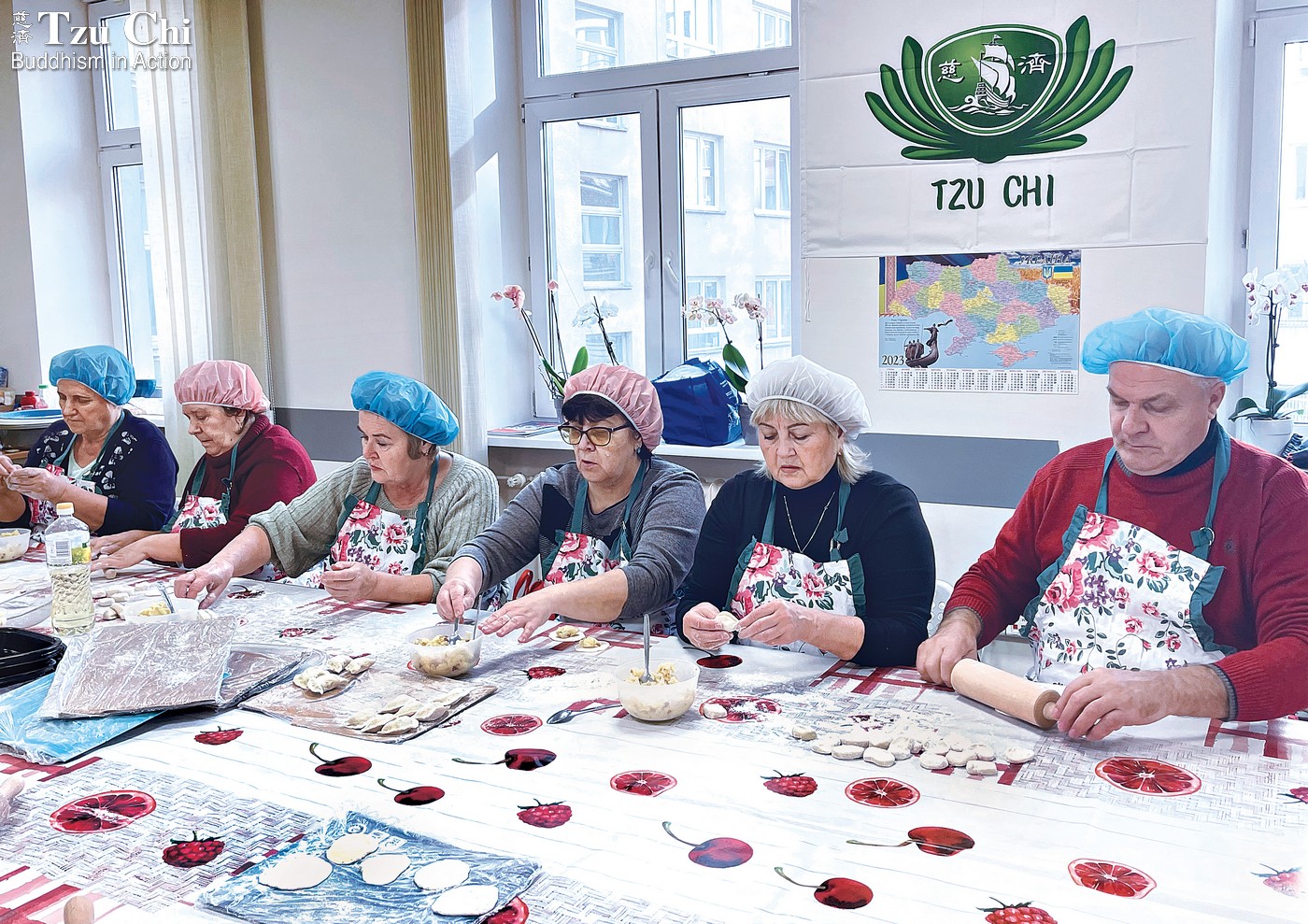
To alleviate the isolation experienced by elderly Ukrainians in Poland, Tzu Chi established a Dumpling Club in its office in Warsaw, inviting older Ukrainians to come together every week to make dumplings. (Courtesy of Ukrainian Tzu Chi volunteers)
Have faith that things will get better
After staying in Poznań for three days and two nights, we returned to the familiar city of Warsaw. Even though Tzu Chi's large-scale distributions for Ukrainian refugees in Poland had concluded by the end of July 2022, the foundation's services in Warsaw had not come to an end. They established an office in the city and hired seven Ukrainian women as staff to continue providing care for their fellow compatriots.
The seven Ukrainian staffers had been diligently conducting home visits over the past months, identifying Ukrainian families in need of assistance. Following assessments by the Tzu Chi Foundation, they started providing economic aid and emotional support to the families in need. In collaboration with the Camillians, a Roman Catholic missionary order based in Italy, they used their expertise to provide character education to children. They also established a "Dumpling Club" to help lead older Ukrainian individuals out of their isolated lives in Poland. They even planned and organized Tzu Chi's first winter distribution in Warsaw, which took place on November 28. What brought us even more joy, aside from witnessing their wholehearted service to their fellow countryfolk, was their ability to stand on their own.
The creation of the Dumpling Club is a good example of the dedicated efforts of these Ukrainian staff members. During their home visits, they encountered elderly individuals from their home country who rarely ventured out due to language barriers or various physical and emotional factors. The volunteers deeply empathized with their situations, so they devised a solution by organizing gatherings at the Tzu Chi office where the seniors could come together and make dumplings—a traditional delicacy often enjoyed during family gatherings in Ukraine and which almost every older Ukrainian knows how to make. Once the dumplings are made, our staff sells them online, with 80 percent of the proceeds going to the elderly participants and the remaining 20 percent allocated to support those in need. This initiative perfectly encapsulates the teachings of Dharma Master Cheng Yen, who encourages us to eat until we are 80 percent full and use the remaining 20 percent to assist the less fortunate. When we visited the Dumpling Club during our stay in Warsaw, we witnessed the smiles on the faces of the elderly. We were truly delighted to see them rediscover a sense of purpose and value in a foreign land, knowing that they were able to contribute to those in need.
"No matter how great the difficulties we face, we must believe that one day the situation will improve. Never give up hope, and always persevere towards your goals. This is the encouragement we give ourselves every day in Türkiye," said Basil and Hani, the two Syrian IT engineers who had come with my wife and me to Poland. They were drawing from their own experiences of displacement to inspire the Ukrainians they encountered in Poland, assuring them that persistence would lead to a turning point.
I was immensely grateful to Basil and Hani for visiting Poland again to encourage the refugees. My gratitude was especially great for Basil, who revealed to me only upon landing that he was actually afraid of flying. Throughout the two-and-a-half-hour flight from Türkiye to Poland, he had been restless and endured great anguish. Despite having gone through similar experiences the last time he visited Poland with us, he was still willing to join us once again. I was greatly touched.
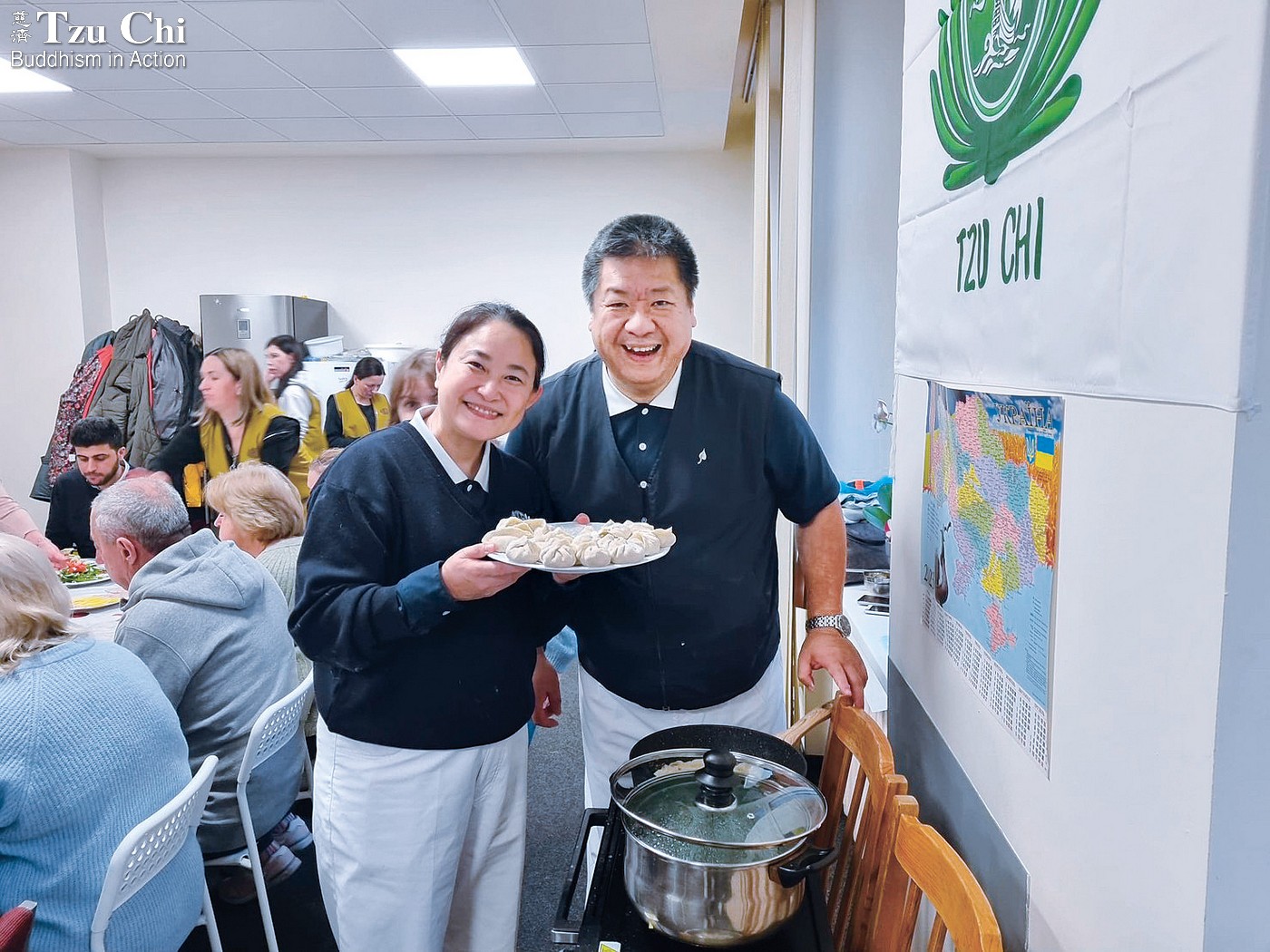
Faisal Hu (right) and Nadya Chou, two Tzu Chi volunteers from Türkiye, visited the Dumpling Club last December, where they served everyone Taiwanese-style dumplings. (Courtesy of Nadya Chou)
Waiting for that day
I recall that on the tenth day of the Russia-Ukraine war, Monica and Łukasz initiated Tzu Chi's first aid distribution to refugees. Soon after, Tzu Chi volunteers from 12 countries and regions arrived in Poland to help with the foundation's relief efforts. The support began with the distribution of gift cards, which could be redeemed at a retail chain in Poland, along with other aid items. Later on, we transitioned to cash cards, universally accepted across Europe. Tzu Chi provided assistance to over 80,000 people through these efforts. In fact, since the war began, our commitment has gone beyond providing practical aid. We have also offered unwavering companionship to those in need.
To help displaced Ukrainian families get through the winter, we conducted eight winter relief distributions in Warsaw. We personally handed out 631 cash cards to 277 vulnerable households, consisting of 841 individuals. Although we expected nothing in return, we deeply understood that all our efforts were worth it when we witnessed the recipients' tearful eyes and felt their tight embraces. We had successfully conveyed love and blessings from around the world to them.
The seven Ukrainian staffers at Tzu Chi's Warsaw office are incredibly courageous and resilient women. They set aside their own pain and dedicate themselves wholeheartedly to caring for their fellow displaced compatriots. Instead of waiting for instructions from the foundation, they proactively take the initiative to identify and solve problems, demonstrating a deep understanding of Tzu Chi's charitable spirit. Following the success of the Dumpling Club, they recently observed that mothers bringing their children to classes could also utilize their waiting time to learn. Therefore, they proposed the idea of offering yoga and ballroom dance classes.
Every time a Ukrainian starts singing the Ukrainian patriotic song "Oh, the Red Viburnum in the Meadow," their eyes light up, and they raise their hands in a resolute gesture, singing out loudly:
Oh, in the meadow a red viburnum has bent down low.
For some reason, our glorious Ukraine is in sorrow.
And we'll take that red viburnum and we will raise it up,
And we shall cheer up our glorious Ukraine, hey, hey!
Despite the challenges they face, we have faith in the dedicated Ukrainian staff members at our Warsaw office. We believe that they will demonstrate the spirit described in the song, that they will go above and beyond to care for their fellow Ukrainians stranded in Warsaw, that they will encourage them to support and uplift one another as they patiently await the day to return home together.
In my 80 days in Poland, I witnessed that love can make even the coldest environments warm, that when people can love and support each other, even strangers become family.
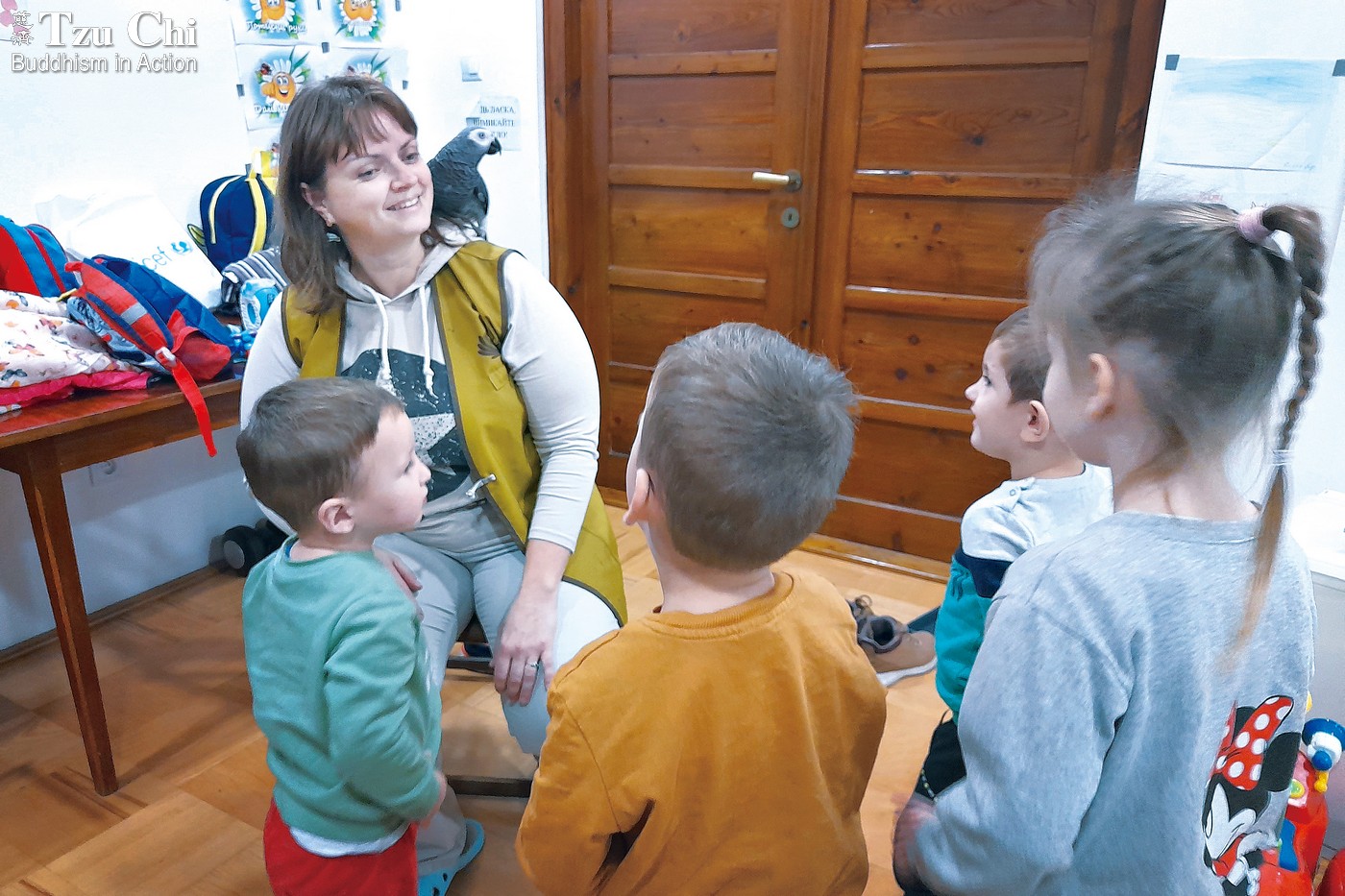
Tzu Chi's Ukrainian helpers in Poland use their expertise to serve their fellow compatriots. Here, Hanna Mankus (left), an English teacher, uses a parrot as her teaching assistant, teaching children how to show kindness towards animals. (Courtesy of Ukrainian Tzu Chi volunteers)
Contact Us | Plan a Visit | Donate
8 Lide Road, Beitou 11259, Taipei, Taiwan
886-2-2898-9999
005741@daaitv.com
©Tzu Chi Culture and Communication Foundation
All rights reserved.
